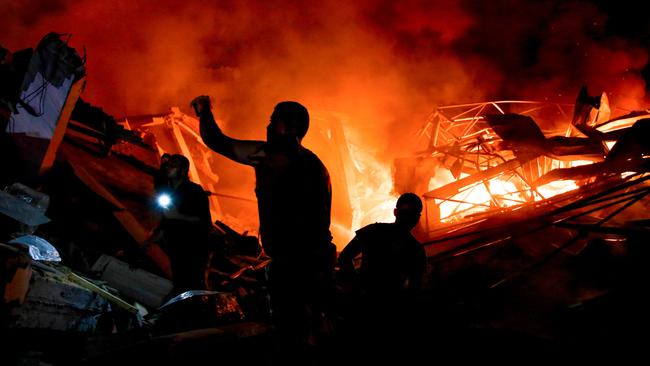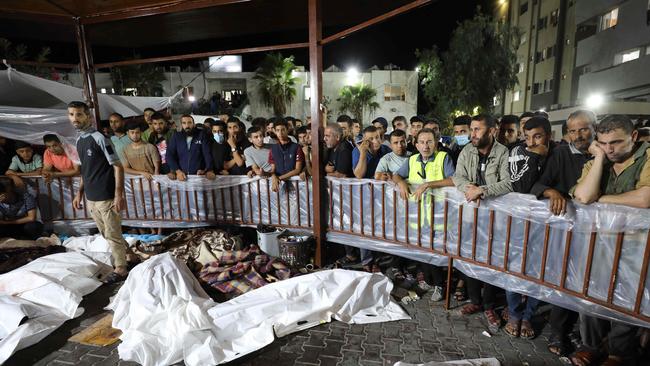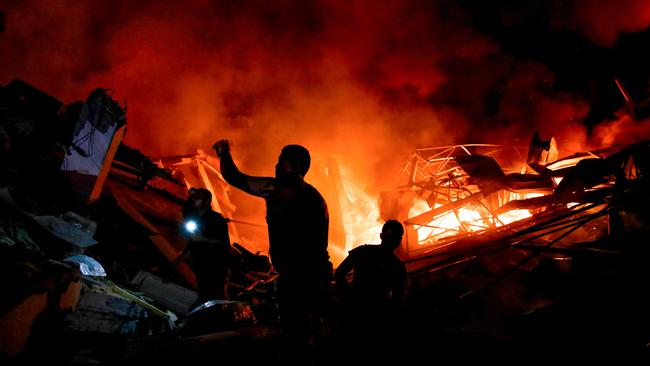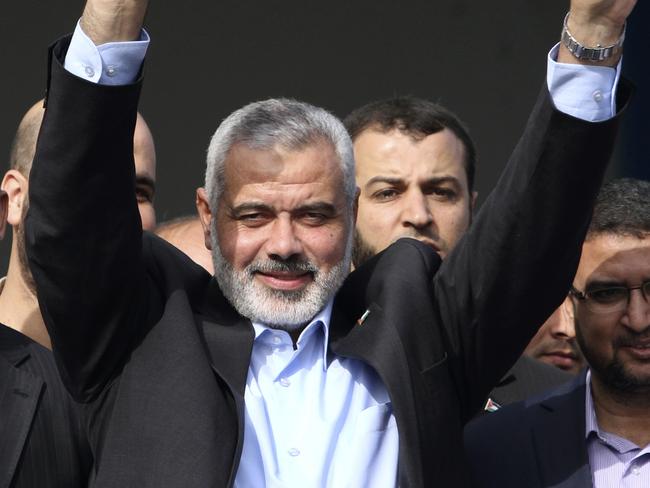Terrifying escalation of Israel-Hamas war
There are worrying signs the Israel-Hamas war is set to be the most violent in a generation – and its fallout could be global.

The Israel-Hamas war is set to be the most violent in a generation. And its fallout could be global. So how can we tell if things are beginning to spiral out of control?
According to Atlantic Council analyst and former White House National Security Council advisor Kirsten Fontenrose, these things tend to follow established patterns.
“It is difficult to predict what decisions the players will make tomorrow – let alone in a week or a month,” she argues. “What we can know in these early days are the early warning signs”.
The Hamas-Israel clash risks triggering an avalanche of violence and snowballing into a much broader regional conflict.
The equally militant Hezbollah jihadist group essentially controls Lebanon to the north. Iranian-backed militias are spread through Syria. And the national sentiment of nations such as Jordan and Egypt is firmly against Israel – despite the muted support of their leaders.
“It will take concerted diplomacy – and considerable luck – to prevent this,” warns the European Council on Foreign Relations. “The war may prove decisive in shaping the future of the regional order.”
The key to the course of the war is Iran.
“Iran’s Supreme Leader Ayatollah Ali Khamenei and Foreign Minister Hossein Amir-Abdollahian are doling out daily reminders that Iran’s “friends” in the Middle East will respond to Israeli abuses of Palestinians,” says Fontenrose. “And Iran’s militias across the Middle East vow to act against US soldiers and interests if the United States strikes Hezbollah.”
About 2500 US troops are stationed across the Middle East, with an additional 900 continuing operations against Islamic State in Syria. These have already been subject to sporadic attacks.
Mere anarchy is loosed upon the world
The bombing of a hospital in Gaza triggered an intense blame game that only forensic analysis on the ground can resolve. Regardless of who was behind the blast that reportedly killed 400 Palestinians, it has further inflamed Arab public opinion. The leaders of Jordan, Egypt and Palestine all cancelled meetings with US President Joe Biden during his visit last week as a result.
“Whoever was behind the incident, it has cemented the popular Arab perception that Israel is conducting a brutal campaign of annihilation against the Palestinians, forcing Arab leaders already concerned by rising violence to harden their own positions,” the ECFR analysts warn.
“These sentiments are being exacerbated by fears that Israel is now trying to push Palestinians out of Gaza and into Egypt in a bid to ensure that they can never return.”

To prevent this, Cairo has closed its borders with Gaza, insisting Israel should not “export” its troubles for somebody else to solve.
Amman says it will consider any forced eviction of Palestinians a “declaration of war”.
“More pertinently, Hezbollah and Iran may feel compelled to escalate in response to growing pressure from their base and the broader Arab public in order to maintain their image as the vanguard of regional resistance to Israel,” they add.
“Any serious escalation by Hezbollah would be sure to unleash a significant military response from Israel against Lebanon – potentially with direct US military backing.”
Such a move would be unacceptable to Iran.
“Confronted with the threat to these two key strategic assets – Hamas and Hezbollah – Iran could enlist armed militias in Iraq and Syria to attack US interests, such as regional military bases, in a cycle that would fuel unchecked escalation across the Middle East.”
Things fall apart; the centre cannot hold
“The critical variable in how this conflict will impact foreign policy in the United States, Europe, and The Gulf is whether it spills over to the broader Middle East,” says Fontenrose.
Much of that depends on the actions of Hezbollah, Iran and Israel.
Frontal assault: Hezbollah is sitting on an arsenal of Iranian explosive drones, guided missiles, and an estimated 20,000 rockets. These are hidden in supply dumps scattered throughout Lebanon and Syria. Once unleashed, Israeli counterattacks will likely trigger a massive “use it or lose it” escalation. “If the IDF stages a ground assault on Gaza, however, Hezbollah appears to be on the hook to jump in the deep end,” says Fontenrose.
Israel evacuation: One warning sign of a significant escalation by Israel would be the evacuation of foreign nationals. “Should an evacuation take place, it will indicate that the United States anticipates escalation,” Fontenrose adds. “Charter planes full of American citizens are already leaving Israel. The Department of Defense is staged for a non-combatant evacuation operation, if necessary.”
Pile-on: Hamas has urged supporters of Palestine to come out in protest. “There was a very real risk that lone wolves could interpret mobilisation to mean acts of violence,” says Fontenrose. But that support may yet manifest itself through terror acts co-ordinated by sympathetic Islamic extremist groups inflamed by a fresh surge of public support.
High-stakes gamble: Iran has been exploiting the power vacuum in the Middle East created by the US invasion of Iraq and the subsequent rise of Islamic State. But it is not yet in a dominant position. “Tehran knows a fight by its regional militias against Israel and its friends is a win-all or lose-all prospect,” Fontenrose explains. “Therefore, if it chooses to ignite a region-wide war, Iran will likely do whatever it takes to mobilise whatever it can.”

Slouching towards Bethlehem
“Even as the world anticipates the next phase in the war, Israel, Europe, Iran, the United States, Arab states, and Palestinians in and outside Gaza all face the same question: What happens the day after the conflict ends?” says Fontenrose.
That depends on whether or not deeply entrenched divisions change. And these have existed since long before the United Nations General Assembly partitioned the Holy Land into separate Jewish and Arab homelands in 1947.
Fight or flight: The Hamas government of Gaza – which considers itself the freedom fighters for Palestinians dispossessed of their homes by expansionist Israeli policies – faces a grim future. “The group will not be allowed to exist as both a terrorist organisation and a political actor,” says Fontenrose. “To survive as a terrorist organisation, the group will be forced underground. Hamas’s political survival or demise is up to Gazans.”

Credibility crisis: The Palestinian Authority, which rules the West Bank under Israeli occupation, is on the brink of irrelevance. “The PA’s past co-operation with Israeli security forces has been exceedingly unpopular among Palestinians and jeopardises the PA leadership’s political future,” says Fontenrose. “Watch for fractures in the inner circle of the PA when negotiations about administering the West Bank and Gaza become public.”
Second Nakba: “Egypt is adamantly pushing back against what it sees as Israeli intent to create a permanent refugee camp in northeastern Sinai,” says Fontenrose. Arab nations fear Israel will once again forcibly expel Palestinians from their homelands. Refugee camps from the 1948 “Nakba” are already scattered throughout the Middle East and are hotbeds of discontent.
Surely some revelation is at hand
“For a while, it was a truism of international affairs that the general contours of a peace plan for Israel and the Palestinians were known but just needed to be agreed upon and implemented,” says Fontenrose. “If that was still true on October 6, it isn’t now.”
No matter what interpretation or modification of the 1947 UN vote is offered, the two-state plan’s future appears dead.
The alternative, however, is equally implausible.
Any attempt by Israel to integrate the populations of the Gaza Strip and West Bank under a single state must contend with generations of hostility and distrust. And accusations of apartheid have already been levelled against Israel’s recent political and legal policies.
Such a solution is also likely to once again destabilise Israel’s relationships with its neighbours.
“Israel’s partnerships with Arab states have counted for little amid the re-eruption of the conflict,” the ECFR analysts note. “While Riyadh may come back to these talks once the war ends, it seems clear that it will not be able to circumnavigate the Palestinian issue.”
The moment of regional de-escalation and re-engagement has passed, they warn. “The Middle East is being dragged back towards a defensive and destructive course”.
All now depends on how Israel, Iran, Jordan, Egypt, Saudi Arabia, Qatar and other regional players react.
“A lesson drawn from previous wars is that a lack of planning for immediate post-conflict governance is a recipe for more conflict,” concludes Fontenrose. “With that in mind, the most critical item to watch as this crisis continues to unfold is the conversation about how Gaza will be governed.”
Originally published as Terrifying escalation of Israel-Hamas war





